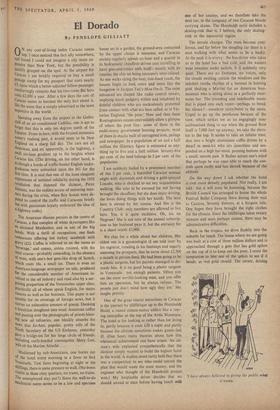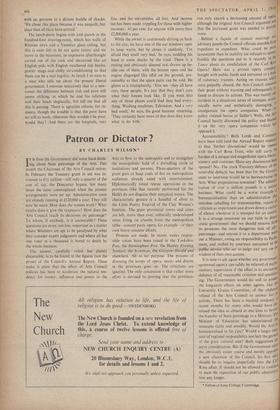El Dorado
By PENELOPE GILLIATT
ON any cost-of-living index Caracas comes top. I once noticed this fact idly somewhere, and found I could not imagine a city more ex- pensive than New York, but the possibility is quickly grasped on the spot. At the airport for Caracas I am briskly required to buy a small Postage stamp for my passport that costs nearly £3; upon which a better-adjusted fellow-passenger comfortingly remarks that his two-room flat here costs £2,000 a year. After a few days the cost of Caracas seems to become the only fact about it, like the scent that is simply advertised as the most expensive in the world. .. .
Speeding away from the airport in the Gothic chill of an air-conditioned Cadillac, one is apt to forget that this is only ten degrees north of the Equator. From in here, with the bruised mountain scenery rushing past, it would seem to be New England on a sharp fall day. The cars are all American, and so, apparently, is the highway, a swift six-lane gradient up to the heights where Caracas lies. (The driving, on the other hand, is as though a horde of traffic-bound English under- graduates were unleashed upon the M l for the first time. It is said that one of the most eloquent expressions of national solidarity during the 1958 revolution that deposed the dictator, Perez Jimenez, was the sudden access of motoring man- ners during the crisis, when Boy Scouts were de- puted to control the traffic and C'aracans briefly but with passionate loyalty embraced the idea of a highway code.) The American illusion persists in the centre of Caracas, a fine complex of white skyscrapers like an etiolated Manhatten. and in any of the big hotels. With a thrill of recognition, one finds restaurants offering hot turkey sandwich with gravy (£2). Coffee is referred to on the menu as beverage,' and comes, unless resisted, with the Meat course—probably coinciding, in the absence of wine, with one's last gem-like drop of Scotch, Which costs 16s. a small tot. There is even an American-language newspaper on sale, produced for the considerable number of Americans in- volved in the oil industry and read also by a sur- Prising proportion of the Venezuelan upper class, Practically all of whom speak English, for status reasons as well as for business. This paper is not notable for its coverage of foreign news, but it carries an exhaustive amount of gossip. Dunking a breakfast doughnut into weak American coffee and passing over the photographs of priests bless- ing new oil refineries, one bleakly absorbs the Ninth that Jo-Ann, popular, pretty wife of the Ninth Secretary of the US Embassy, yesterday gave a bridge-tea for her large circle of friends, including curly-headed cosmopolite Mary Lou, Wife of the Marine Attaché....
Maddened by sub-Americana, one bursts out of the hotel every morning in a fever to find Venezuela. Taxi fares beginning at eight or ten shillings, there is some pressure to walk. (No buses visible in these ritzy quarters, no trams, no trains. The unemployed stay put?) Since the well-to-do residential norm seems to be a low and spacious house set in a garden, the ground-area consumed by the upper classes is immense, and Caracan society regularly spends an hour and a quarter in its hydramatic chauffeur-driven cars travelling to have gins-and-tonics with itself : mostly with its cousins, the chic set being intricately inter-related. As one walks along the neat, tree-lined roads, the houses begin to look more and more like the bungalow in Jacques Tati's Mon Oncle. The most advanced are shaped like radio control towers, implying much gadgetry within and inhabited by doleful children who are meticulously protected from contact with what are here called, as in Vic- torian England, 'the poor.' Now and then these Rustingtonian estates unavoidably allow a glimpse of where the poor live: some of them in the multi-storey government housing projects; most of them in shacks built of corrugated iron, palings and newspaper. In a population of six and a half million the illiteracy figure is estimated as any- thing up to five and a half million. Seventy-five per cent. of the land belongs to 2 per cent. of the population.
I am suddenly hailed by a prominent member of this 2 per cent., a beautiful Caracan woman alight with diamonds and driving a gold-sprayed Lincoln, who is shocked to see any acquaintance walking. She asks to be excused for not having brought the chauffeur, but she does enjoy driving; she loves doing things with her hands. The land here is owned by her cousin. And this is the Country Club; only members are allowed to live here. Yes, it is quite exclusive. Oh, no, no Negroes! She is not sure of the annual subscrip- tion as her husband pays it, but the entrance fee is a share worth £3,000.
We chat for a while about her children. Her eldest son is a gynecologist (I am told later by his registrar, treading in his footsteps and eagerly assessing the prospects, that he earns about £2,500 a month in private fees). He had been going to be a plastic surgeon, but his parents managed to dis- suade him. It is no good being a plastic surgeon in Venezuela : not enough patients. 'Often you see the most terrible-looking man, and you offer him an operation, but he always refuses. The people just don't mind how ugly they are.' She laughs prettily.
One of the great tourist attractions in Caracas is the journey by telefdrique up to the Humboldt Hotel, a round sixteen-storey edifice like a rear- ing caterpillar at the top of the Avila Mountain. The hotel is for looking at rather than for living in, partly because it costs £20 a night and partly because the altitude sometimes makes guests feel ill. (One hears many theories about how this whimsical achievement can have arisen. An oil- man's wife explained sympathetically that the dictator simply wanted to build the highest hotel in the world. A student more tartly held that there was a competition to see who could submit the plan that would waste the most money, and the engineer who thought of the Humboldt project won.) My hospitable driver decides that we should ascend at once before having lunch with one of her cousins, and we therefore take the next car, in the company of two Caracan bloods carrying skates. The Humboldt eyrie includes a skating-rink that is, I believe, the only skating- rink in the equatorial region.
The terrain changes. The trees become coni- ferous, and far below the dangling car there is a man walking with what seems to be a husky. At the peak it is wintry: the bus-driver who takes us to the hotel has a bad cold, and the waiters wear sweaters under jackets. It is suddenly very quiet. There are no footsteps, no voices, only the clouds swirling outside the windows and the indolent rumba rhythm of a barman in hunting pink shaking a Martini for an American busi- nessman who is sitting alone in a perfectly enor- mous bar. The unending and indefinable music that is piped into each room—perhaps to break the silence?--somehow contributes to the stasis. Urged to go up the penthouse because of the view, which strikes me as an engagingly non- acclimatised thing to say when the ground floor itself is 7,000 feet up anyway, we take the eleva- tor to the top. It seems to take an infinite time, shut into a bright aluminium coffin driven by a dwarf in mess-kit who sits speechless and sus- pended on a high bar-stool, pressing buttons with a small, remote paw. It flashes across one's mind that perhaps he was once able to reach the con- trols quite easily and has shrunk because of the altitude.
On the way down I ask whether the hotel is ever more densely populated. Not really, I am told: but it will soon be humming, because the British Council has arranged to house the whole Festival Ballet Company there during their visit to Caracas. Seventy dancers, at a bargain rate. One hopes they have brought the right clothes for the climate. Since the tdleferique takes twenty minutes and seats perhaps sixteen, there may be administrative difficulties.
Back in the tropics, we drive flashily into the suburbs for lunch. The house where we are going was built at a cost of three million dollars and is approached through a gate that has gold spikes on the top of it to keep out the poor. I resist the temptation to bite one of the spikes to see if it bends, as real gold should. The owner, driving
'I have always believed in giving the public what it wants.'
with us, gestures to a distant huddle of shacks. `We chose this place because it was unspoilt, but since then all these have arrived ' The lunch-party begins with iced punch in the hundred-foot drawing-room, which has walls of Russian onyx and a Venetian glass ceiling, but this is soon felt to be not quite itztime and we move to the basement, an expensive afterthought carved out of the rock and decorated like an English pub, with English weathered oak beams, pewter mugs and chilly air-conditioning so that there can be a real log-fire. At lunch I sit next to a man who tells me about the present liberal government. I murmur tentatively that to a new- comer the difference between rich and poor still seems striking, at which he and his relations nod their heads elegiacally, but tell me that all this is passing. There is agrarian reform, for in- stance, though the trouble is that the poor have no will to work, otherwise they wouldn't be poor, would they? And there are the hospitals, very fine, and the universities, all free. And income tax has been made crippling for those with higher incomes: 45 per cent. for anyone with more than £2,800,000 a year.
While the owner is courteously driving us back to the city, we have one of the car windows open to keep warm, but he closes it suddenly. `I'm afraid they smell very bad,' he says, nodding his head at some shacks by the road. There is a rusting and obviously disused taxi drawn up be- side one of them, with the bonnet open and the engine disgorged like offal on the ground, pre- sumably so that the spare parts can be sold. He glares at it triumphantly. 'You see—they all have cars, these people. It's just that they don't care what their houses look like. If you went into any of those places you'd find they had every- thing. Washing machines. Television. And a very bad smell,' he says, his good humour returning. `They certainly have more of that than they know what to do with.'



































 Previous page
Previous page